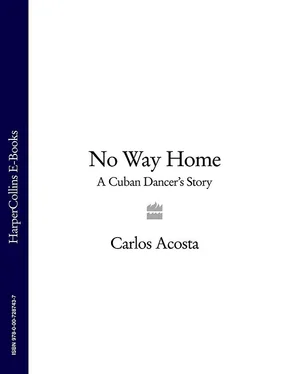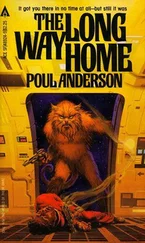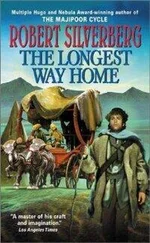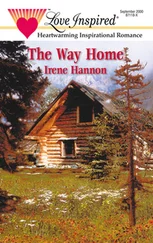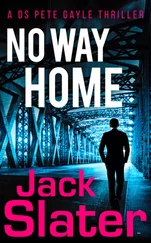‘Careful a frog doesn’t pee on you or you’ll go blind,’ said Pedro Julio, then we heard another voice.
‘Blind! I’ll leave you blind with the beating I’m going to give you!’
I stuck my head out of the pool and saw the imposing and unmistakable figure of my father.
‘You little bastard, how many times have I told you I don’t want to see you swimming in that disgusting water?’
My father pulled me out of the pool by my ear and threw me onto the rocks.
‘Wait, Papito, let me explain!’
My father was not in the mood for explanations.
‘Walk before I crack your head open,’ he said as he dragged me through the undergrowth and rocks.
‘Didn’t I tell you to wait in the house? Have you forgotten that today is the day of the photo? I’m going to kill you!
Shit, I thought as I scrambled along, colliding with the branches and sharp twigs sticking out of the bushes and trees, I had forgotten the photo.
We passed the caves and Cundo’s house and started down the hill. The people came out of their houses when they heard my father shouting. My stormy relationship with my father was a source of entertainment in the neighbourhood.
‘Hey Peeeedro … leeeave the boooyyy alooone!’ said Juanito, the drunk, as my father shook and slapped me about.
‘Out of my way Juanito!’ My old man pushed him roughly.
‘Heeeey, dooon’t you staaart picking on meeee. I’m Juaaaanito the druuuunk!’
We left Juanito with his bottle and continued on down the hill. When we arrived at my building, Zoilita, Rene, Yolanda, Candida, all the neighbours were waiting.
‘Finally you’re going to make him pay,’ they all cheered, as if a runaway criminal had just been captured. Rene was looking very satisfied with himself – he had obviously told my parents where to find me. My father walked me straight past them and up the stairs to our apartment. My mother sluiced me down to get the mud off, dressed me in my only pair of trousers, the better of my two pairs of shoes and my one school shirt. My father insisted that I wear a tie.
‘No, Mami, not the tie!’
‘You, shut your mouth!’ said my old man angrily.
‘There’s no need to yell, Pedro, we’ll make it in time,’ my mother said soothingly.
We went down the stairs once more and the neighbours started to applaud again.
‘Finally, they’re going to turn you into a respectable human being,’ said Rene smiling from his doorway.
No sooner were we inside the big wooden house of the neighbourhood photographer, than he got out a device as old as Methuselah, set it up on the cool, tiled floor and told me to sit still. Then he put his head under a cloth attached to the back of the antique apparatus and pressed a button with his right hand.
A week later my mother collected the photo, framed it and placed it in a corner of the sitting room. That was the first photo ever taken of me and it is the only image that exists of me before ballet entered my life.
CHAPTER THREE
All I ever thought about was sport. Football was my obsession. I had ambitions to become a great player. For a long time, without my parents knowing, I tried to get into a school that trained future footballers. Sometimes, however, wanting something badly just is not enough. During the training sessions I would kill myself doing sit-ups and press-ups and running round the track. The fruit of all my labours was that I was selected to play in a match. I touched the ball twice during the game and did not make any mistakes so I was proud of how I had done and left the pitch confident that the coach would give me a scholarship. When the next day the coach treated me with indifference, I did not take it too much to heart. The following day it was the same, however, and gradually over the next few weeks I realized I had no prospects in the team: I just was not good enough. From that moment on my hopes of winning a football scholarship started to evaporate in front of my eyes. My dream of becoming the future Pelé crumbled, and though I persevered, every day the coach treated me just a little bit worse, trying to slowly break my spirit until eventually he succeeded.
It was around that time that the break-dancing craze hit Cuba. My sister Marilín was a magnificent dancer and from time to time she would show me some of her moves and take me with her to street parties. After two months, I had learnt how to spin round on my shoulders and even on my head. When Marilín saw me she was speechless.
‘Where did you learn to do that?’ she asked, astonished.
‘Oh just round about …’ I replied, unwilling to go into details.
‘But when did you practise?’ she insisted.
‘In my spare time …’
The truth is that whilst Marilín was at school, I would meet up with a gang of friends in order to practise break-dancing all day long. Bit by bit, we break-dancers started to organize a club in an adjacent neighbourhood called Vieja Linda. There we would close off the streets with rubbish bins to stop cars coming through, and with the music up at full volume we would rehearse new steps in order to compete with other neighbourhoods in Havana. I particularly remember one of these competitions which took place in Parque Lenin, a huge recreation area on the outskirts of the city where at the weekends there would be salsa contests, singing competitions and history or science quizzes for children.
When the break-dancing competition was announced my gang knew it would be an important contest for our reputation and that we could not possibly miss it. So there we were, at seven o’clock on a Sunday morning, with all the tools of our trade: dark glasses, gloves worn like Michael Jackson, big baggy shirts and baseball caps. We carried our ghetto-blasters and chomped away on bits of sticking plaster since there was no chewing gum.
The first prize was a trophy with a picture of Lenin surrounded by the hammer and sickle, the second prize was a bag of sweets and the third a diploma. My friend Opito and I were the only members of the gang eligible to compete because the contest was only open to kids under fourteen. Opito and I had won competitions before, dancing as a pair in Cerro and Monaco and other Havana neighbourhoods. Two nine-year-old boys, one white with ginger hair and one black, was a combination that never failed.
All the big names from the Havana break-dancing scene were there: Papo el Bucanda, Alexander ‘the Toaster’ el Tostao, that kid from the Embil district they nicknamed Michael Jackson, and Miguelito la Peste, ‘Mickey the Stink’, himself.
Everybody chewed their pieces of sticking plaster and wore their baseball caps back to front as Opito and I got ready to do our thing. As soon as we began to dance, I was filled with an indescribable sensation of release. Growing up poor had taught all of us Los Pinos kids never to ask for anything, not to have any expectations, and because of this I was quite a timid boy. But when I danced my shyness fell away and I felt like a different person: confident, attractive and free. Along with the first drops of sweat came the desire to shout my existence to the world, to become everything I dreamt. I danced my heart out for half an hour.
At the end of the contest, I was baptized El Moro de Los Pinos – the Moor of Los Pinos – by the rest of the boys in the gang, and Mickey the Stink himself held out his hand to me and said, with a challenging smile, ‘See you around.’
I still have that trophy of Lenin with his hammer and sickle. Those were my first steps towards the art of dance.
The news reached my father’s ears that I was running around the streets with gangs like a bandit.
‘We have to do something, María, otherwise we’re going to lose the boy,’ he said to my mother, in a fury.
Читать дальше
